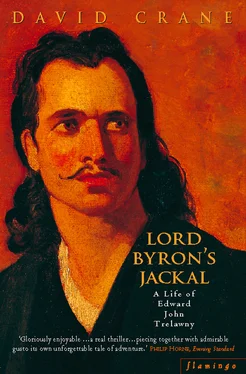There are few conflicts before this century which so insistently demand to be remembered in terms of human misery, but if it is these horrors of 1821 that have left their most vivid mark on the national psyches of Greece and Turkey, it was the events of the next year that determined whether revolt would ever blossom into a full-scale war for independence. During the first months of rebellion Ottoman armies had been too busy with Ali Pasha of Ionnanina to deal with a second uprising as well, but with Ali’s murder on 5 February 1822 Sultan Mahmoud II, a ruler of slow and inexorable purpose, was at last free to turn his full attention to Greece itself.
The Ottoman plan was simple, and was embarked on with a characteristic confidence that took no account of terrain, season or opposition. From his base at Larissa in northern Greece the overall commander in Roumeli, Khurshid Pasha, sent two armies southwards down the western and eastern sides of the country, the first towards Misssolonghi and the other under the command of Dramali Pasha across the Isthmus of Corinth and into the Peloponnese and the heartland of the revolt.
With 23,000 men and 60,000 horses, Dramali’s army was the greatest to enter Greece in over a hundred years. Sweeping virtually unchallenged across the isthmus in July 1822, the Turks pushed down as far as Argos only to be reduced within a month by disease, privation, incompetence and unripened fruit to a dangerous and humiliating retreat through the unsecured mountain passes south of Corinth.
This retreat of Dramali’s weakened army gave the Greeks their greatest opportunity of the war in a terrain for which history, temperament and necessity had left them supremely well equipped. To the disgust of every foreigner reared on western tactics, their irregulars could never be made to stand up to Turkish cavalry in open conflict, but here among the crags and narrow mountain paths of Dervenakia it was another story, with those guerrilla skills honed by generations of brigand klephts coming spectacularly into their own.
With the Ottoman army trapped ‘like a herd of bisons’ 3 in the narrow passes, flight or defiance equally useless, Dervenakia was less a battle than a massacre. If the Greeks had not been more interested in plunder than killing, the slaughter would have been still worse, but even so five thousand Turks were killed and the army which had been sent to bring back ‘the ashes of the Peloponnese’ effectively destroyed. Ravaged by disease and hunger the remnant began their retreat along the southern coast of the Gulf of Corinth towards Patras, reduced first to horseflesh and then cannibalism, fighting among themselves over the graves of their comrades, burying their dead in the mornings only to dig them up again at night in a gruesome bid to ward off starvation.
Dervenakia gave the Greek army its most decisive victory of the whole war but just as important in its way was the campaign fought at the same time in western Greece. The army that had slaughtered the Turks in the passes of the north-east Peloponnese had fought under the most experienced of brigand chiefs in Theodore Colocotrones, but the force raised to face the Ottoman threat to Missolonghi was entrusted to the leadership of a newly arrived Phanariot aristocrat, Alexander Mavrocordato, a man for all his other talents without any experience of warfare and little enough of Greece itself.
The details of the campaign which followed belong properly to the military history of the rebellion, but the political and psychological impact of Mavrocordato’s failure are too important to ignore. The first task of this force was to relieve the Christian Suliote tribes of Epirus on the Turkish army’s right flank, and with this in mind Mavrocordato marched north from Missolonghi towards Arta with an army of a little over two thousand men, including in its ranks about one hundred Philhellene volunteers who had come out in the first months of the uprising.
The absurd vanity of many of these Philhellenes and the ingratitude of the Greeks they had come to save had already strained relations in Mavrocordato’s camp, and the first pitched battle they fought together confirmed the prejudices of both sides. Establishing his own headquarters at Langada on the eastern shore of the Ambracian Gulf, Mavrocordato pushed his army forward under the command of General Normann, his Chief of Staff. Advancing as far as Peta, a small village in the low hills to the east of the Turkish held town of Arta, Normann’s army prepared to face the enemy in a battle which could lose them everything and win them very little. In the van were their regular troops, comprising the Philhellene corps, and two battalions of Ionian volunteers and Greek soldiers. Behind them, holding the high ground and guarding their right flank, was a force of Greek irregulars led by an old and cynical bandit chief of dubious loyalty, Gogos.
Against the vastly superior force of infantry and cavalry that issued from Arta, the regulars held firm, their discipline and firepower repulsing the first Turkish assault without casualties. For the next two hours the battle seemed still to go their way, but while the Turkish commander, Reshid Pasha, kept up a desultory frontal attack on this force, a large contingent of his Albanian soldiers was marching in a flanking movement to the north in a bid to turn the Greek position.
With a strong body of Greek irregulars commanding the high ground, this should have been impossible, and the first that the Philhellenes knew of their fate was when they saw the Ottoman standard planted on the highest hill behind them. Gogos, in league with the enemy, had fled. The regulars were now hopelessly surrounded. Leading the cavalry himself, Reshid stormed their position, capturing their two pieces of artillery. Only twenty-five of the volunteers managed to force a way at bayonet point through the Turkish fines. The rest, fighting heroically to the end, redeemed every Philhellene folly by their courage, dying where they stood, or more horribly, on the walls of Arta.
The failure of Reshid to follow up his victory by taking Missolonghi limited the short-term significance of this campaign, but the strategic consequences of Peta reverberated dangerously on through the rest of the war. From the first tactless intrusion of Philhellene volunteers there had been an innate prejudice among Greeks against western methods of warfare, and with the contrasting evidence of Peta and Dervenakia at their disposal that breezy sense of superiority which is never far below the surface of the Greek national character hardened into an arrogance that would have fatal consequences.
For the time being, however, the rebellion was safe. With the defeat of Dramali’s army in the east and the withdrawal of Reshid in the west, Turkish initiative and energy were exhausted. Their troops still held on to Patras at the western end of the Gulf and to Modon and Coron – the old ‘Eyes of Venice’ – in the south-west. Up in the north, Greek resistance, isolated and exposed, had all but collapsed. In Attica, though, the former pupil of Ali Pasha, Odysseus Androutses, held Athens. In western Greece the heroism of Missolonghi had saved the town for even greater fame. At sea Ottoman and Greek fleets seemed as bent on avoiding each other as anything else. And in the Peloponnese – or the Morea as it was more usually known – the original heartland of the revolution, the Greeks did what Greeks have always done best when freed of external threat, and turned on one other.
Even through the dangers and triumphs of 1821–2, the divisions among the Greek leaders were never far below the surface, and by the middle of 1823 the country was sliding inexorably towards civil war. To the enthusiastic Philhellenes of Europe and America, it might seem that Greece had found itself the heirs to Demosthenes and Epaminondas, and yet even after a National Constitution and Government were established at Epidaurus on 13 January, with an executive and legislature and all the trappings of modern statehood, real power remained in the hands of local factions bent on turning the rebellion to their own narrow profit.
Читать дальше












